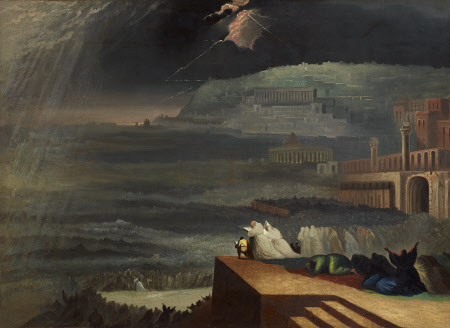Worship Helps for Pentecost 6
Artwork: The Repentance of
Nineveh
Artist: John Martin
Worship Theme: Following seems easy. We just go behind the person in
front of us. But following Jesus daily for our whole lives requires endurance.
It is a struggle between our old and new selves.
Old Testament: Jonah 3:3-4:4
3So Jonah set out and went to Nineveh just
as the word of the Lord had
commanded. Now Nineveh was a great city to God. It required a three-day walk. 4Jonah
walked through the city for a day, and he called out, “Forty more days and
Nineveh is going to be overthrown!”
5The men of Nineveh believed God. They
proclaimed a fast and put on sackcloth, from the greatest of them to the least.
6When word reached the king of Nineveh, he got up from his throne,
took off his royal robe, covered himself with sackcloth, and sat in ashes. 7Then
he issued a proclamation in Nineveh.
By the decree of the king and his leading
officials:
Do not let people or animals, herds or
flocks, taste anything. Do not let them eat food or drink water. 8Instead
let people and animals be covered with sackcloth. Let everyone call fervently
to God. Let them turn from their evil way and from the violence that is in
their hands. 9Who knows? God may turn and relent. He may turn from
his burning anger so that we will not perish.
10When God saw their actions, that
they had turned from their evil way, God relented from the disaster which he
said he would bring on them, and he did not carry it out.
4:1But to Jonah all this seemed very
bad, and he became very angry. 2He prayed to the Lord, “Lord,
wasn’t this exactly what I said when I was still in my own country? That is why
I previously fled to Tarshish, because I knew that you are a gracious and
merciful God, slow to anger and abounding in mercy, and you relent from sending
disaster. 3So now, Lord,
please take my life from me, for it is better for me to die than to live.”
4But the Lord
replied, “Is it right for you to be angry?”
1. When Jonah
finally got to the city where God had sent him and preached there, the people
on Nineveh believed God. When he saw what they did and how they turned from
their evil ways, what did God do? (See 3:10.)
2. How angry was
Jonah, as a result?
Epistle: 2 Corinthians 11:21–30
21I am ashamed to say that we were
too weak for that!
22Are they Hebrews? So am I. Are they
Israelites? So am I. Are they Abraham’s seed? So am I. 23Are they
ministers of Christ? (I am speaking in a crazy way.) I am even more. I’ve done
more hard work, been in prisons more often, been whipped far more, and I’ve
been close to death many times. 24Five times I received from the
Jews the forty lashes minus one. 25Three times I was beaten with
rods. One time I was stoned. Three times I was shipwrecked. I have spent a
night and a day on the open sea. 26I have often been on journeys, in
danger from rivers, in danger from robbers, in danger from my own people, in
danger from Gentiles, in danger in the city, in danger in the wilderness, in
danger on the sea, in danger among false brothers. 27I have worked
hard and struggled. I’ve spent many sleepless nights. I’ve been hungry and
thirsty. I’ve gone without food many times. I’ve been cold and lacked clothing.
28Besides those external matters,
there is the daily pressure on me of my concern for all the churches. 29Who
is weak without my being weak? Who falls into sin without my being distressed?
30If it is necessary that I boast, I
will boast of the things that show my weakness.
3. When Paul
compared himself to the “super-apostles” in Corinth, he did not list all his
success. What did he list?
4. What other
constant pressure did Paul feel? (See 11:28.)
5. About what
then, did Paul boast? (See 11:30-32.)
Gospel: Luke 9:51–62
51When the days were approaching for
him to be taken up, Jesus was determined to go to Jerusalem. 52He
sent messengers ahead of him. They went and entered a Samaritan village to make
preparations for him. 53But the people did not welcome him, because
he was determined to go to Jerusalem. 54When his disciples James and
John saw this, they said, “Lord, do you want us to call down fire from heaven
to consume them?”
55But he turned and rebuked them.
“You don’t know what kind of spirit is influencing you. 56For the
Son of Man did not come to destroy people’s souls, but to save them.” Then they
went to another village.
57As they went on the way, a man said
to him, “I will follow you wherever you go.”
58Jesus said to him, “Foxes have
holes, and birds of the air have nests, but the Son of Man has no place to lay
his head.”
59He said to another man, “Follow
me!”
But he said, “Lord, first let me go and
bury my father.”
60Jesus told him, “Let the dead bury
their own dead, but you go and proclaim the kingdom of God.”
61Another man also said, “I will
follow you, Lord, but first let me say good-bye to those at my home.”
62Jesus told him, “No one who puts
his hand to the plow and looks back is fit for the kingdom of God.”
6. As the time
approached for Jesus to be taken up to heaven, what did he do? (See verse 51.)
7. Why didn’t one
Samaritan village welcome Jesus? (See verse 53.)
8. What is the
main point for us, as Jesus talks with three men separately about following him
(verses 57–62)?
Answers:
1. When God
saw how the Ninevites repented and turned from their evil ways, he had
compassion and did not bring upon them the destruction he had threatened.
2. Jonah was so angry at God’s patience and mercy—which
Jonah knew by heart from God’s description of himself in Exodus 34:6-7—that
Jonah got irate. He told God he wanted to die. He refused to answer God when
God asked him if he had a right to be so upset. (How similar we can be to
Jonah! How opposite Jesus was!)
3. Paul listed as his credentials all the trials he had
gone through, including imprisonment, frequent floggings and many dangers. He
had often been near death.
4. Paul also felt daily the pressure of his concern for
all the Christians in the churches he had helped start and had visited. When
the people were weak, he felt weak. When believers fell into sin, it tore Paul
up inside.
5. Paul
boasted about his weakness, not his strengths. Final case in point: Paul began
his ministry by narrowly escaping death in Damascus.
6. As the
time approached for Jesus to be taken up to heaven, Jesus resolutely set out
for Jerusalem. Literally, he “fixed his face for Jerusalem.” He was determined
to die for us.
7. The people
of the Samaritan village did not welcome Jesus, because he was heading for
Jerusalem. Jews and Samaritans in Jesus’ day usually had strong dislike for
each other. (Yet Jesus had mercy on these people.)
8. The main
point for us, as Jesus talks with three men about following him, is full
dedication to Jesus and his kingdom. Halfway? No way.
Putting your faith into action
Corporations today often run what is known as a cost-benefit
analysis. Before spending millions of dollars the company wants to know what
real benefits will result. If the ultimate benefits to the company don’t
outweigh the expenses, the project is killed. Most of us, at least
subconsciously, do a cost-benefit analysis of our giving. To give time, energy,
and money to church costs us something personal. If all we do is weigh the
physical evidence, we will concentrate too much on what we are giving up.
However, our relationship to the Lord is spiritual. If we look with spiritual
eyes, we will see that the rewards of being part of God’s kingdom far outweigh
the earthly cost.
This heresy is that the Mass
justifies by the outward act, that when applied it merits the pardon of guilt
and punishment even for the unjust if they do not present an obstacle. We object to these deadly errors, which
divert people from the glory of Christ’s passion and overthrow the doctrine
about the righteousness of faith. In the
[Old Testament], the godless believed they merited the forgiveness of sins, not
through faith, but through sacrifices. They increased these services and
sacrifices, set up the worship of Baal in Israel, and even sacrificed in the
groves in Judah. Therefore, the prophets
condemn this belief and war against not only the worshipers of Baal, but also
other priests who made sacrifices ordained by God with this godless belief [1
Kings 18:1–40]. Carnal people cannot
tolerate that the honor of an atoning sacrifice belongs solely to Christ’s
sacrifice because they do not understand the righteousness of faith. The godless priests in Judah held a false
belief about such sacrifices; Baal worship even continued in Israel. Nevertheless, a Church of God was there that
objected to these godless services [1 Kings 19:18]. Baal worship remains in the realm of the pope:
the abuse of the Mass. They think they
can merit the pardon of guilt and punishment for the unrighteous. All who believe the Gospel should condemn
these wicked services. – Apology of the Augsburg Confession, Article XXIV, The
Mass (paragraphs 96-98)
1 Jesus, I my cross have taken, All to leave
and follow you.
Destitute, despised,
forsaken, You on earth once suffered, too.
Perish ev’ry fond ambition,
All I’ve ever hoped or known;
Yet how rich is my condition!
God and heav’n are still my own.
2 Let the world despise and leave me; They have
left my Savior, too.
Human hearts and looks
deceive me; You are not, like them, untrue.
And since you have smiled
upon me, God of wisdom, love, and might,
Foes may hate and friends may
shun me—Show your face, and all is bright.
3 Go, then, earthly fame and treasure! Come, disaster,
scorn, and pain!
In your service pain is
pleasure; With your favor loss is gain.
I have called you Abba,
Father! You my all in all shall be.
Storms may howl, and clouds
may gather; All must work for good to me.
4 Haste, my soul, from grace to glory, Armed by
faith and winged by prayer.
All but heav’n is transitory;
God’s own hand shall guide you there.
Soon shall end this earthly
story; Swift shall pass the pilgrim days,
Hope soon change to heav’nly
glory, Faith to sight and prayer to praise.
Text: Henry F. Lyte,
1793–1847, abr., alt.



Comments
Post a Comment